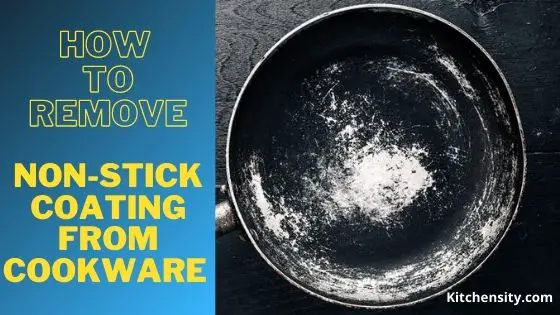Copper pans are beloved by chefs and home cooks alike for their excellent heat conductivity and even cooking.
However, one common issue that can be encountered while cooking with copper pans is food sticking to the surface. This can lead to frustrating cooking experiences and difficult clean-ups.
In this article, we will explore various techniques and tips to keep food from sticking to copper pans, ensuring you make the most of this remarkable cookware.
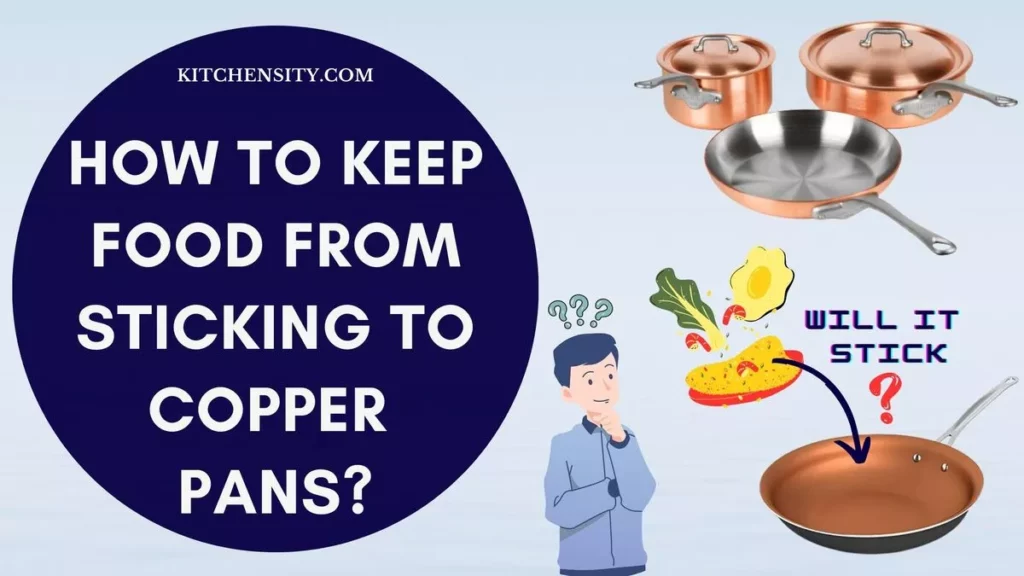
Table of Contents
- 1 How To Keep Food From Sticking To Copper Pans?
- 2 Understanding Copper Pans
- 3 Why Food Sticks To Copper Pans?
- 4 9 Ways To Keep Food From Sticking To Copper Pans
- 5 What You Need To Know Before Seasoning Copper Pans?
- 6 How To Season A Copper Pan?
- 7 Why Do Eggs Stick To My Copper Chef Pan?
- 8 Cleaning And Maintenance Of Copper Pans
- 9 How To Clean A Seasoned Copper Pan After Use?
- 10 Common Mistakes To Avoid
- 11 Final Verdict
- 12 FAQs
- 12.1 Do You Grease Copper Pans For Baking?
- 12.2 Can You Use Olive Oil In Copper Pans?
- 12.3 Can I Use Butter Or Margarine For Seasoning My Copper Pan?
- 12.4 How Often Should I Re-Season My Copper Pan?
- 12.5 Can I Use Copper Polish To Clean My Copper Pan?
- 12.6 Can I Cook Acidic Foods In A Copper Pan?
- 12.7 Are Copper Pans Safe To Use?
How To Keep Food From Sticking To Copper Pans?
To keep food from sticking to copper pans, it is crucial to season the pan properly, creating a natural non-stick surface. Additionally, using cooking oils with high smoke points, avoiding overheating, and practicing gentle handwashing will help maintain the non-stick properties and prolong the lifespan of the pan.
Also Read – Why Is Cast Iron Pan Sticky After Seasoning?
Understanding Copper Pans
Copper is a highly conductive material that allows for precise temperature control while cooking. It distributes heat evenly across the cooking surface, making it ideal for delicate dishes and precise cooking techniques.
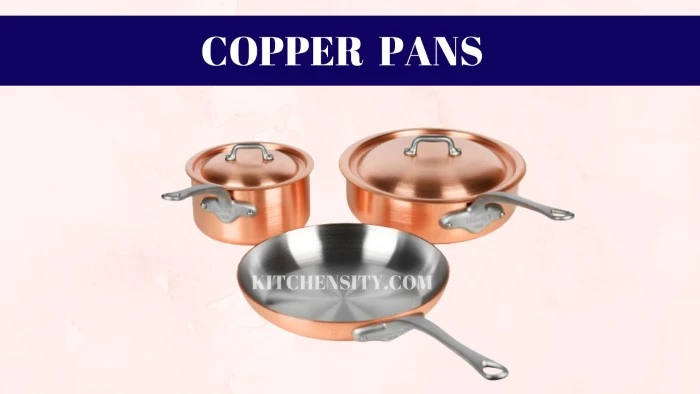
1. Lining Of Copper Pans
While copper is a fantastic material for cooking, it does come with a caveat. Copper can react with certain foods, especially those that are acidic.
To prevent any adverse reactions and ensure the safety of your dishes, copper pans are often lined with other materials.
Two common lining options are:
- Stainless Steel: Many modern copper pans are lined with stainless steel. Stainless steel is a non-reactive material, which means it won’t interact with the food being cooked. It also adds to the durability and longevity of the pan.
- Tin: Traditional copper pans are lined with tin. Tin is also non-reactive and provides a smooth cooking surface. However, Tin linings require more delicate handling and occasional re-tinning to maintain their effectiveness.
Also Read – Why Do Ceramic Pans Lose Their Nonstick Properties?
2. Thickness Matters
The thickness of the copper pan plays a crucial role in its performance.
- Copper pans come in various thicknesses, usually measured in millimeters. Thicker pans tend to offer better heat distribution and retention, which contributes to more even cooking.
- While thinner copper pans may heat up quickly, they can also lose heat faster, making temperature control a bit more challenging. Thicker pans, on the other hand, offer greater stability in temperature.
3. Reactivity With Certain Foods
Copper has some reactivity with certain foods, particularly acidic ones. Foods like tomatoes, vinegar-based sauces, or citrus fruits can cause a chemical reaction with copper, resulting in a metallic taste and potentially unsafe compounds.
To avoid this, it’s essential to use copper pans with non-reactive linings, such as stainless steel or tin when cooking dishes that contain acidic ingredients.
Also Read – How to Season a Nonstick Pan for First Time?
Why Food Sticks To Copper Pans?
While copper pans offer many advantages in the kitchen, one common issue that can arise during cooking is food sticking to the surface. Let’s explore the reasons behind food sticking to copper pans and discover how to overcome this challenge.
1. The Role Of Seasoning
One of the primary reasons why food sticks to copper pans is the lack of proper seasoning.
- Seasoning is the process of creating a thin, natural non-stick coating on the pan’s cooking surface.
- It involves applying a layer of cooking oil and heating it to a specific temperature, which polymerizes the oil, forming a protective layer.
When a copper pan is well-seasoned, it creates a barrier between the food and the copper, preventing direct contact. Without this protective layer, the food can adhere to the exposed copper surface, leading to sticking.
Also Read – Why Does Food Stick To My Enamel Cast Iron?
2. Overheating The Pan
Another factor that contributes to food sticking is overheating the copper pan.
Copper is an excellent heat conductor, and it can reach high temperatures quickly. However, using excessively high heat for extended periods can cause the seasoning to break down, leading to food sticking to the pan.
To avoid this, it’s crucial to adjust the cooking temperature accordingly and avoid using extremely high heat when not necessary.
3. Using The Wrong Cooking Oil
The choice of cooking oil also plays a role in preventing food from sticking to copper pans. Oils with low smoke points, such as olive oil or butter, are more likely to burn and leave residue on the pan’s surface, causing food to stick.
Opt for cooking oils with high smoke points, such as vegetable oil, canola oil, or peanut oil, as they are better suited for high-heat cooking and less likely to leave behind sticky residues.
Also Read – How To Get Sticky Residue Off Non-Stick Pans?
4. Neglecting Maintenance
Proper maintenance of copper pans is vital to prevent food from sticking. Over time, the seasoning on the pan may wear off or degrade, leading to a loss of its non-stick properties.
Regularly inspect the condition of the seasoning, and when necessary, re-season the pan to maintain its effectiveness.
Additionally, avoid using abrasive cleaners or scrubbers that can damage the seasoning and the pan’s lining.
5. Cooking Acidic Foods
Copper has some reactivity with acidic foods, such as tomatoes, vinegar, or citrus fruits. When cooking dishes with these ingredients in an unlined copper pan, a chemical reaction can occur, causing the food to stick and imparting a metallic taste.
To avoid this issue, use copper pans with non-reactive linings, such as stainless steel or tin, when cooking acidic dishes.
So, food sticks to copper pans primarily due to a lack of proper seasoning, overheating, using the wrong cooking oil, neglecting maintenance, and cooking acidic foods in unlined copper pans.
With proper seasoning, appropriate heat management, and regular maintenance, you can ensure that your copper pans provide a non-stick and enjoyable cooking experience for years to come.
Also Read – How To Clean Broiler Pans?
9 Ways To Keep Food From Sticking To Copper Pans
To ensure your culinary creations slide effortlessly off the pan, here are some effective ways to keep food from sticking to copper pans:
- Season Your Copper Pan:
- One of the most crucial steps in preventing food from sticking is the proper seasoning of your copper pan.
- Seasoning creates a natural non-stick coating on the pan’s surface, reducing the chances of food adhering to the copper.
- To season your pan, apply a thin layer of high-smoke-point oil, such as vegetable or canola oil, and heat it in the oven at a recommended temperature for about an hour.
- Repeat this process as needed to maintain the non-stick properties.
- Use The Right Cooking Oil:
- Choosing the right cooking oil can make a significant difference in preventing sticking.
- Oils with high smoke points, like grapeseed or peanut oil, are ideal for high-heat cooking with copper pans.
- These oils are less likely to burn and leave sticky residues on the pan.
- Cook At The Right Temperature:
- Maintaining the proper cooking temperature is essential for avoiding food sticking to copper pans.
- Cooking at extremely high heat can cause the seasoning to break down, leading to sticking.
- Adjust the heat as needed during cooking to avoid overheating the pan.
- Avoid High Heat:
- Copper pans are excellent conductors of heat, and they heat up quickly.
- While this is advantageous for cooking, using excessively high heat for extended periods can lead to food sticking.
- Opt for medium to medium-high heat for most cooking tasks.
- Stir Frequently: Stirring your food regularly while cooking helps distribute the heat evenly and prevents it from sticking to the pan. This practice is especially important when sautéing or stir-frying.
- Use Non-Metal Utensils: Avoid using metal utensils when cooking with copper pans, as they can scratch the seasoning and damage the pan’s surface. Opt for non-metal utensils like silicone or wooden ones to preserve the non-stick properties.
- Allow Food To Rest:
- After cooking, allow your food to rest in the pan for a few minutes before serving or transferring it to a plate.
- Allowing the food to rest allows steam to escape and makes it easier to release it from the pan.
- Clean And Maintain Regularly:
- Proper cleaning and maintenance are essential for keeping your copper pans in top-notch condition.
- Handwash the pan with mild dish soap and a soft sponge after each use.
- Avoid using abrasive cleaners or scrubbers that can damage the seasoning.
- Re-Season When Needed:
- If you notice food sticking to your copper pan despite following these tips, it may be time to re-season the pan.
- Repeating the seasoning process can revitalize the non-stick properties and restore the pan’s performance.
By implementing these methods, you can ensure that your copper pan remains a reliable and enjoyable tool in your kitchen, providing you with delicious and beautifully cooked meals without the frustration of food sticking to the surface.
Also Read – How To Clean Burnt Glass Pans?
What You Need To Know Before Seasoning Copper Pans?
Before seasoning copper pans, there are several important points to consider. Proper seasoning is crucial to create a natural non-stick surface and enhance the performance of your copper pans.
Here’s what you need to know before seasoning copper pans:
- Check The Manufacturer’s Instructions:
- Different copper pans may have specific seasoning guidelines provided by the manufacturer.
- Before seasoning, review the care instructions and recommendations to ensure you follow the correct process for your particular pan.
- Inspect The Pan’s Condition: Before seasoning, examine the copper pan for any signs of damage, such as scratches, dents, or loose rivets. Seasoning can help protect the pan’s surface, but it may not be as effective if the pan is in poor condition.
- Clean The Pan Thoroughly: Ensure the copper pan is clean and free from any dirt, oil, or debris. Wash the pan with warm soapy water and a soft sponge, then rinse it thoroughly to remove any soap residue.
- Choose The Right Oil: Select a high-smoke-point oil for seasoning your copper pan. Oils like vegetable oil, canola oil, or grapeseed oil are excellent choices as they can withstand high temperatures without burning.
- Apply A Thin & Even Layer Of Oil: Use a paper towel or soft cloth to apply a thin layer of oil on the interior surface of the copper pan. Make sure to cover the entire cooking surface, including the sides and edges, while avoiding excess oil.
- Remove Excess Oil: After applying the oil, gently wipe off any excess with a clean paper towel or cloth. Having too much oil can lead to a sticky residue during the seasoning process.
- Preheat The Oven: Preheat your oven to the recommended temperature for seasoning the copper pan. The typical temperature ranges from 300°F to 400°F (150°C to 200°C). Refer to the manufacturer’s instructions or specific guidelines.
- Bake The Pan: Place the oiled copper pan upside down on the middle oven rack. This allows any excess oil to drip away from the cooking surface. Bake the pan for about an hour to allow the oil to polymerize and form a protective layer.
- Allow The Pan To Cool Gradually: After the seasoning time is complete, turn off the oven and leave the pan inside to cool down gradually. Avoid removing the hot pan from the oven, as sudden temperature changes may affect the seasoning.
- Repeat If Necessary: Depending on the pan’s condition or the desired level of seasoning, you may need to repeat the seasoning process multiple times. Some pans may require several rounds of seasoning to achieve the desired non-stick surface.
By keeping these essential points in mind, you can effectively season your copper pans and enjoy their remarkable cooking performance for many delightful culinary experiences.
Also Read – How To Get Burnt Sugar Off A Pan?
How To Season A Copper Pan?
Seasoning a copper pan is a crucial step to create a natural non-stick surface and enhance its cooking performance. The process involves coating the pan with a thin layer of cooking oil and heating it to a specific temperature, which polymerizes the oil and forms a protective layer.
Follow these steps to season your copper pan effectively:
- Clean The Pan Thoroughly:
- Before starting the seasoning process, ensure that the copper pan is clean and free from any dust or debris.
- Wash the pan with warm soapy water and a soft sponge.
- Rinse it thoroughly to remove any soap residue, and then dry it completely.
- Choose The Right Oil:
- Select a high-smoke-point oil for seasoning your copper pan.
- Oils like grapeseed oil, flaxseed oil, canola oil, or vegetable oil are excellent choices.
- Avoid using low-smoke-point oils like olive oil or butter, as they are more likely to burn during the seasoning process.
- Apply The Oil:
- Pour a small amount of the chosen oil into the copper pan.
- Use a paper towel or a soft cloth to spread the oil evenly across the interior surface of the pan.
- Make sure to cover the entire cooking surface, including the sides and edges.
- Remove Excess Oil:
- After coating the pan with oil, take a clean paper towel or cloth and gently wipe off any excess oil.
- The goal is to have a thin, even layer of oil on the pan.
- Removing excess oil helps prevent a sticky residue from forming during the seasoning process.
- Preheat The Oven:
- Preheat your oven to the recommended temperature for seasoning the copper pan.
- The typical temperature for seasoning ranges from 300°F to 400°F (150°C to 200°C).
- Refer to the manufacturer’s instructions or the specific guidelines for your pan.
- Bake The Pan: Place the oiled copper pan upside down on the middle oven rack. This allows any excess oil to drip away from the cooking surface. Bake the pan for about an hour to allow the oil to polymerize and form a durable non-stick layer.
- Let It Cool: After the seasoning time is complete, turn off the oven and leave the pan inside to cool down gradually. Avoid removing the pan from the oven while it’s still hot, as sudden temperature changes may affect the seasoning.
- Repeat If Necessary: Depending on the condition of the pan or the desired level of seasoning, you may need to repeat the seasoning process a few times. Some pans may require several rounds of seasoning to achieve the desired non-stick surface.
- Maintain The Seasoning:
- To maintain the seasoning of your copper pan, avoid using harsh abrasive cleaners or metal utensils that can scratch the surface.
- Instead, handwash the pan with warm soapy water and a soft sponge after each use.
- If the seasoning starts to wear off over time, simply re-season the pan following the same steps.
Also Read – How To Season Stainless Steel Pots And Pans?
Why Do Eggs Stick To My Copper Chef Pan?
If eggs are sticking to your Copper Chef pan, there could be several reasons for this issue. Even though copper pans are known for their superior heat conductivity and non-stick properties, certain factors can affect their performance with specific foods like eggs.
Here are some common reasons why eggs may stick to your Copper Chef pan:
- Seasoning Issues: Seasoning is a crucial step to create a natural non-stick surface on copper pans. If the pan’s seasoning is worn out or not adequately applied, it can lead to eggs sticking. Ensure that your Copper Chef pan is well-seasoned before cooking.
- Insufficient Preheating: Preheating the pan properly is essential for even heat distribution and for creating a non-stick surface. If the pan is not adequately preheated before adding the eggs, they may stick to the surface.
- Cooking Temperature: Cooking eggs at extremely high heat can cause them to stick to the pan. Eggs are delicate and cook best at medium to medium-low heat. Adjust the heat accordingly to avoid sticking.
- Cooking Oil: The type of cooking oil used can affect the non-stick performance. Using oils with low smoke points, like olive oil or butter, at high temperatures can lead to sticking. Opt for oils with high smoke points, such as vegetable oil or canola oil, for cooking eggs.
- Cooking Time: Overcooking eggs can cause them to dry out and stick to the pan. Cook eggs just until they are set, as overcooking can compromise their texture and make them more prone to sticking.
- Not Enough Fat: Adding a little extra fat, such as butter or cooking spray, before cooking eggs can help create a non-stick barrier between the eggs and the pan.
- Cooking With An Unlined Pan: Some copper pans may not have a non-reactive lining, making them unsuitable for cooking certain foods like eggs, which are mildly acidic. If your Copper Chef pan is unlined, consider using a different pan for cooking eggs.
- Food Residue: Leftover food residues from previous cooking can contribute to eggs sticking. Make sure to clean your pan thoroughly before cooking eggs to prevent any leftover residue from affecting the non-stick performance.
- Cooking Technique: The way you cook eggs can also impact sticking. For example, cracking eggs directly onto the pan’s surface may lead to sticking. You can crack eggs into a separate bowl first and then gently slide them onto the preheated pan to avoid sticking.
By considering these factors and making necessary adjustments, you can improve the non-stick performance of your Copper Chef pan and enjoy perfectly cooked eggs without sticking issues.
Also Read – How To Clean Burnt Hard Anodized Cookware?
Cleaning And Maintenance Of Copper Pans
Copper pans are not only functional but also add a touch of elegance to your kitchen. To keep them in pristine condition and maintain their excellent cooking performance, proper cleaning, and maintenance are essential.
Here are some valuable tips on how to clean and care for your copper pans:
- Gentle Handwashing:
- When it’s time to clean your copper pan, avoid using harsh abrasive materials or dishwashers.
- Instead, opt for gentle handwashing using warm soapy water and a soft sponge.
- The soft sponge will effectively remove any residues without scratching the pan’s surface.
- Avoid Abrasive Cleaners:
- Refrain from using abrasive cleaners or scouring pads on your copper pans.
- These abrasive materials can damage the copper and any lining, compromising their functionality and appearance.
- Remove Stuck-On Food Gently:
- If you encounter stuck-on food residues after cooking, soak the pan in warm soapy water for a short while to loosen the debris.
- Then, use a soft sponge to gently scrub the pan until the residues come off.
- Avoid Extreme Temperature Changes:
- Copper is sensitive to rapid temperature changes.
- To prevent warping or damage, avoid placing hot copper pans directly under cold water or on cold surfaces immediately after cooking.
- Let the pan cool down gradually before cleaning.
- Re-Season When Needed:
- Over time, the seasoning on your copper pan may wear off.
- If you notice food starting to stick to the surface, it may be time to re-season the pan.
- The seasoning process involves applying a thin layer of cooking oil and heating the pan to create a natural non-stick coating.
- Use Non-Metal Utensils:
- To protect the lining and seasoning of your copper pan, use non-metal utensils such as silicone or wooden ones.
- Metal utensils can scratch the pan’s surface, leading to diminished non-stick capabilities.
- Store Properly:
- When not in use, store your copper pans in a dry and cool place. Avoid stacking them to prevent scratches and damage to the surface.
- Consider using pan protectors or soft cloth between pans to preserve their condition.
- Polish Occasionally:
- To maintain the lustrous appearance of your copper pans, consider giving them an occasional polish.
- There are copper cleaning solutions available that can help restore their shine.
- However, avoid using copper polish on the cooking surface as it can be harmful.
- Check Handles And Rivets:
- Regularly inspect the handles and rivets of your copper pans. Ensure they are securely attached and not loose.
- Loose handles can be hazardous and should be addressed promptly.
- Handle With Care: Treat your copper pans with care to avoid dents or scratches. Avoid banging them against hard surfaces or dropping them, as this can damage their appearance and performance.
Also Read – How To Clean Burnt Calphalon Pans?
How To Clean A Seasoned Copper Pan After Use?
Cleaning a seasoned copper pan after use is essential to maintain its non-stick properties and overall quality. Follow these steps to clean your seasoned copper pan properly:
- Allow The Pan To Cool: After cooking, let the copper pan cool down to a safe temperature before cleaning. Avoid cleaning a hot pan, as it can lead to damage and burns.
- Gently Handwash The Pan: Wash the seasoned copper pan by hand using warm soapy water and a soft sponge or cloth. Avoid using abrasive cleaners, scouring pads, or dishwashers, as they can damage the seasoning and the pan’s surface.
- Use A Soft Sponge Or Cloth: When scrubbing the pan, use a soft sponge or cloth to remove any food residues gently. The non-stick coating should make it easy to clean off most food particles.
- Avoid Harsh Chemicals: Refrain from using harsh chemicals or cleaning agents on the seasoned copper pan, as they can strip away the seasoning and diminish its non-stick properties.
- Soak If Necessary: If there are stubborn or stuck-on food particles, soak the pan in warm soapy water for a short while to loosen the debris. This will make it easier to clean without damaging the seasoning.
- Avoid Metal Utensils: Do not use metal utensils to clean the seasoned copper pan, as they can scratch the surface and ruin the non-stick coating. Opt for non-metal utensils like silicone or wood.
- Dry Thoroughly: After cleaning, rinse the pan with clean water and dry it thoroughly with a soft cloth. Ensuring the pan is completely dry prevents water spots and maintains the seasoning.
- Store Properly: When not in use, store the seasoned copper pan in a dry and cool place. Avoid stacking pans directly on top of each other without any protection, as it can lead to scratches and damage.
- Re-Seasoning If Needed: Over time, the seasoning on the copper pan may wear off. If you notice food starting to stick or the non-stick properties diminishing, it may be time to re-season the pan to restore its effectiveness.
- Regular Maintenance: Regularly inspect the condition of the seasoning on your copper pan and perform maintenance as needed. Proper care and cleaning will extend the lifespan of the seasoned copper pan and ensure its optimal performance.
Also Read – Le Creuset Enamel Worn Off! How To Re-Enamel Le Creuset Cookware
Common Mistakes To Avoid
Here are some common mistakes to avoid when using copper pans:
- Overheating The Pan: Using excessively high heat for extended periods can damage the pan and break down the seasoning.
- Using Metal Utensils:
- Metal spatulas or whisks can scratch the delicate lining or seasoning of copper pans.
- Opt for non-metal utensils like silicone, wood, or nylon to preserve the non-stick properties.
- Neglecting Seasoning And Maintenance:
- Proper seasoning creates a natural non-stick coating on copper pans.
- Neglecting to season the pan can lead to food sticking and reduced effectiveness.
- Follow proper cleaning and maintenance routines to keep the pan in top condition.
- Cooking Acidic Foods In Unlined Copper Pans:
- Copper reacts with acidic foods, leading to a metallic taste and potentially unsafe compounds.
- Use copper pans with non-reactive linings, such as stainless steel or tin, for acidic dishes.
- Neglecting Proper Cleaning Techniques:
- Abrasive cleaners, scouring pads, or dishwashers can damage the pan’s surface.
- Always handwash the copper pans with gentle dish soap and a soft sponge.
- Storing Pans Improperly:
- Avoid stacking copper pans without protection, as it can cause scratches and damage.
- Consider using pan protectors or soft cloth between pans when storing them.
- Ignoring Loose Handles Or Rivets:
- Regularly inspect the handles and rivets for any looseness or wobbliness.
- Loose handles can be hazardous during cooking and should be repaired promptly.
- Cooking Without Preheating:
- Preheating the copper pan evenly distributes heat and creates a non-stick surface.
- Skipping this step can result in uneven cooking and food sticking to the pan.
- Using Low Smoke Point Oils:
- Oils with low smoke points, like olive oil or butter, can burn and leave sticky residues.
- Opt for oils with high smoke points, such as canola or vegetable oil, for high-heat cooking.
- Neglecting Food Resting Time:
- Allow food to rest in the pan for a few minutes after cooking.
- Resting helps release steam and makes it easier to remove the food without sticking.
Also Read – Do Aluminum Pans Work On Induction?
Final Verdict
In conclusion, preventing food from sticking to copper pans is essential to maintain its non-stick properties and ensure an enjoyable cooking experience.
By following the right techniques and practices, you can make the most of your copper pans’ exceptional heat conductivity and versatility in the kitchen.
Proper seasoning of copper pans creates a natural non-stick coating, forming a protective barrier between the food and the copper surface. Additionally, choosing the right cooking oil with a high smoke point and avoiding overheating the pan is crucial to prevent food from sticking.
Regular maintenance, including gentle handwashing and avoiding harsh chemicals or abrasive materials, helps preserve the pan’s seasoning and extends its lifespan. Using non-metal utensils and cooking acidic foods in lined pans are also key factors in preventing sticking.
By being mindful of these tips and techniques, you can confidently cook a wide range of dishes in your copper pans without worrying about food sticking.
Embrace the joy of culinary exploration with your copper pans, as they consistently deliver delicious results and elevate your cooking to new heights.
With proper care and attention, your seasoned copper pans will continue to serve you as reliable kitchen companions, providing delightful meals for years to come.
Also Read – Is Stainless Steel Safe For Cooking?
FAQs
-
Do You Grease Copper Pans For Baking?
Yes, greasing copper pans for baking is recommended to prevent food from sticking and ensure easy release.
-
Can You Use Olive Oil In Copper Pans?
While it is possible to use olive oil in copper pans, oils with higher smoke points like vegetable or canola oil are more suitable for high-heat cooking to avoid burning or producing sticky residues.
-
Can I Use Butter Or Margarine For Seasoning My Copper Pan?
It’s best to use high-smoke-point oils like vegetable oil or canola oil for seasoning.
-
How Often Should I Re-Season My Copper Pan?
Depending on usage, it’s generally recommended to re-season your copper pan every few months.
-
Can I Use Copper Polish To Clean My Copper Pan?
No, avoid using copper polish on the cooking surface as it can be harmful. Stick to gentle handwashing.
-
Can I Cook Acidic Foods In A Copper Pan?
It’s best to avoid cooking highly acidic foods in a copper pan, as they can react with the copper.
-
Are Copper Pans Safe To Use?
Yes, as long as they are lined with a non-reactive material like stainless steel or tin, copper pans are safe for cooking.
Katrina Smith is a seasoned expert with over 25 years of experience in all things related to cooking and the kitchen. As an avid cook and kitchen enthusiast, she is passionate about sharing her knowledge and expertise on cookware, kitchen appliances, kitchen tips, and kitchen staples.
Through her articles and reviews, Katrina aims to inspire and help others improve their cooking skills, experiment with different ingredients, and invest in quality cookware and appliances.

![How To Season And Clean Cast Iron Cookware? [4 Effective Ways] 4 How To Season And Clean Cast Iron Cookware](https://www.kitchensity.com/wp-content/uploads/2020/06/How-To-Season-And-Clean-Cast-Iron-Cookware.jpg)
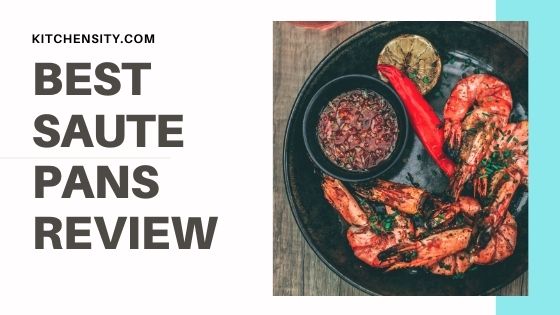
![Stainless Steel Vs Nonstick Vs Ceramic Cookware Set [An Ultimate Guide 2023] 6 Stainless Steel vs Nonstick vs Ceramic Cookware Set](https://www.kitchensity.com/wp-content/uploads/2019/09/Stainless-Steel-vs-Ceramic-vs-Nonstick-Cookware-Sets-e1621083482728.jpg)
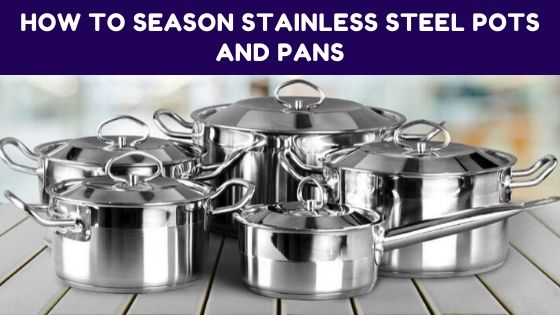
![What Pans Can You Use Cooking Spray On? [Ultimate Guide] 8 Types of pans with which cooking spray can be used](https://www.kitchensity.com/wp-content/uploads/2023/02/What-Pans-Can-You-Use-Cooking-Spray-On.jpg)
